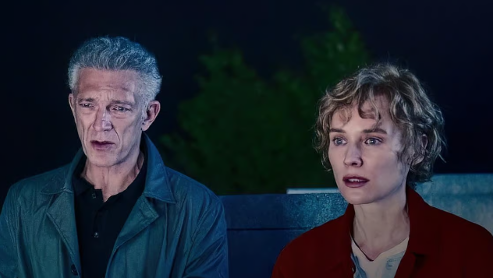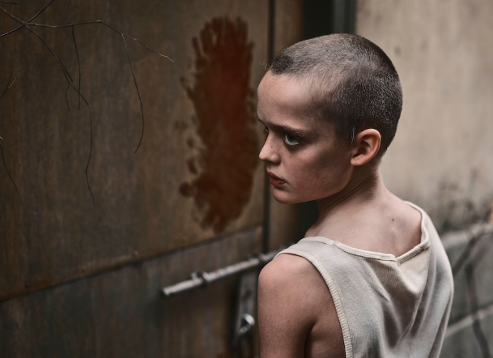THE SHROUDS

Cast: Vincent Cassel, Diane Kruger, Guy Pearce, Sandrine Holt, Elizabeth Saunders, Jennifer Dale, Eric Weinthal
Writer/Director: David Cronenberg
119 mins.
The deeply personal inspiration for this film was David Cronenberg’s grief over the death of his wife in 2017. The film’s opening credits sequence features an array of swirling dots that eventually form the outline of a woman. Allied with the insinuating low-pitched electronic droning of Howard Shore’s score, the sequence dissolves into a dreamy vision of a man looking into the prehistoric-looking underground surroundings of a nude female corpse, before the camera zooms right into the yelling man’s mouth and snaps us back into reality – as we see Karsh Relikh (Vincent Cassel) having his teeth inspected by his dentist, Dr. Hofstra (Eric Weinthal). We are in distinctly Cronenberg-style territory, with the director thrusting forbidding bodily imagery in front of us. Also, abundantly in dialogue scenes, important events are generally talked about rather than directly shown. The cinematography is almost unnerving in its digital clarity, with the film showing an alternately intrigued and critical fascination with the ways technology encroaches on humanity, a paranoid interest in rooting out underlying conspiracies.
Grief may be the starting point for what proliferates in The Shrouds, but Cronenberg has much more on his mind than that. Karsh’s response to the death of his wife, Becca (Diane Kruger), is to create GraveTech, a technology that allows people to monitor their loved ones’ corpses with the help of special shrouds—outfits with many tiny X-ray cameras embedded inside—that their bodies are kitted out with when they’re underground. When, one evening, a grave site featuring bodies buried with GraveTech, including Becca’s, is vandalised, he, with the help of a computer programmer, Maury (Guy Pearce), try to figure out who is responsible and why. In that sense, The Shrouds could be said to be a mystery tale—one that, to give the film even more of a topical flavour, it eventually involves the possibility of both Russians and Chinese interested in GraveTech. To some degree, the mystery elements are secondary to what’s primarily a study of a deeply troubled individual. Karsh is surrounded by technology. Not only does he owns a self-driving Tesla, but also uses a virtual personal assistant, named Hunny (voiced by Kruger), created by Maury to help keep his life in order. All the technology in the world, though, can’t console him in the wake of his great personal loss, as both an agonisingly awkward blind date early on and assorted dream sequences throughout the film demonstrate. Karsh eventually finds some solace in the company of two women: Soo-Min Szabo (Sandrine Holt), the blind wife of a Hungarian magnate and potential client on the verge of death, and, most perversely, Becca’s sister, Terry (Kruger yet again), who, it turns out, has a fetish for conspiracy theories. Karsh and Terry’s sex scene together constitutes the one genuine moment of heat in a film that’s otherwise noteworthy for its willed sterility. Maury’s presence adds another layer of romantic complication, since he’s Terry’s ex-husband. Cronenberg observes all of this with an eerie calm and if you’re willing to go along with his deliberate flow, there are plenty of intellectual and emotional connections to be made.
The Shrouds offers a cautionary tale of the limits of technology in dealing with complex human emotions, especially when such technology can be so easily manipulated by outside forces—personal, multi-national, or otherwise. Even more disquieting is the writer/director’s refusal to pass easy judgment on Karsh. There’s a romanticism to Karsh’s stated desire to be buried next to his wife in his graveyard even as there’s a grotesqueness in his obsession with using his technology to glimpse her bones. The Shrouds is clearly willing to dive headfirst into the depths of twisted human desire even if the ending is more than a little obtuse.

Cast: Sora Wong, Billy Barratt, Sally Hawkins, Jonah Wren Phillips, Mischa Heywood, Sally-Anne Upton, Stephen Phillips.
Directors: Danny Philippou, Michael Philippou
99 mins
Horror films explicitly tackling grief are hardly a recent development, but it’s difficult to argue against the fact that we’ve seen this theme exploited at an increasing output to less-satisfying results in the previous decade, adding unnecessary weight to even the sleaziest of slashers. Twin brothers Danny and Michael Philippou share those reservations about the lazy utilisations of a universally relatable theme that have made their way into cinemas on a near-weekly basis. Their wildly ambitious sophomore effort Bring Her Back gradually reveals itself to be a direct statement on the cheap exploitation of grief, channelling existential nihilism to explore just how unhealthy it is to process death at such a surface level. That it’s also one of the most distressing, anxiety-inducing horror films of recent memory when taken at face value is just a bonus.
Shortly after the death of their father, step-siblings Andy (Billy Barratt) and Piper (Sora Wong) are sent to live with a new foster parent for what they both assume will be a three-month period before Andy turns 18 and can apply for guardianship. Instead they’re unfortunate enough to be placed under the roof of Laura (Sally Hawkins), a former child therapist who seems oddly eager to rifle through their baggage, from the childhood accident which left Piper almost entirely blind to Andy’s own experiences of abuse at his father’s hands. With Laura still reeling from the death of her daughter several years earlier and boasting an established record as a foster parent, the siblings initially overlook these quirks––until the strange behaviour of her other foster son Oliver (Jonah Wren Phillips) becomes impossible for Andy to ignore. Realising she can drive a wedge between the two, Laura aims to present Andy as an unreliable narrator to his blind sister, manipulating every waking moment of his life to force him out of the picture entirely. To go into greater detail about Laura’s plans would risk giving away too much about the very specific horror area the brothers are playing in, stripping down an unlikely subgenre to the barest of bones and completely reinvigorating it in the process. Instead I’ll call attention to the vividly realised monster who doesn’t lurk in the shadows: Hawkins’ Laura is initially introduced as an unfiltered, annoyingly troublesome cousin to her Happy-Go-Lucky protagonist Poppy, only to plumb new depths with every scene. This isn’t a glib comparison, either; it truly seems the directors used that breakout performance as a template, showing how someone with boundless wonder and empathy can curdle with cynicism after hitting an obstacle they couldn’t move past, and are now failing to see the sociopath they’ve become from pure intentions. Laura’s impure motivations reveal her to be a quietly terrifying figure for her immature inability to healthily process death. Maybe the scariest sequence is of pure domestic drama where she forces the two underage kids to get blind drunk with her at a make-shift wake for their father, following a funeral in which she gets mad at Andy for grieving in a manner she perceives as incorrect. It functions as both a pivotal moment in drawing out every character’s relationships with their deceased family and a commentary on the wave of grief-inflected horror flicks; there’s no universal way to grieve, but you wouldn’t know it from how conventionally it’s been handled in recent films. The boy struggling to articulate his complicated feelings is punished by a woman whose straightforward, almost childish attempts at grieving have failed to grapple with the very personal finality of it all. Piper’s disability––being blind in one eye and nearsighted in the other––is weaponised by Laura throughout, but though her inability to perceive events is a driving narrative force, the filmmakers never use it as a reductive device. There are throwaway moments to show how everyday activities have been impacted by her blindness, but never which paint her as a victim; she may be in a position where she’s being emotionally exploited, but it’s the sinister foster parent, not the condition she’s long since adapted to, which jeopardises her agency. Her character is never defined by blindness, even if it shapes the ways she experiences the world, and it’s one of many means by which the directors show themselves, despite putting their characters through hell, to be humane. Bring Her Back might be an unsparing, brutal experience, but nothing is ever nihilistic for the sake of it. The film is paired with genuine warmth towards these young protagonists. They might not blink at the idea of forcing endurance, and are far bolder than other horror filmmakers with children in peril, but it would be a stretch to accuse them––as you could for some within that same movement––of mindlessly torturing characters without a deeper purpose. The Philippous understand that the best way to pay tribute to their influences is to expand upon them, making even the most devoted genre fan squint to notice their origins. Bring Her Back‘s brutal adventurousness shows them operating in another league entirely, with their shared cine-literacy beyond a chosen genre on full display. It’s one of the boldest, purest horror offerings of late.